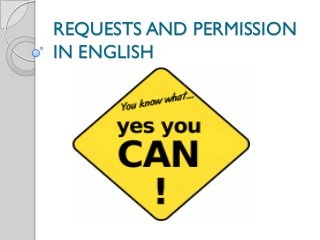
Requests
- 1. REQUESTS AND PERMISSION IN ENGLISH
- 2. PERMISSION: Asking for permission We use can to ask for permission to do something: Eg, Can I ask a question, please? Could and may can also be used (more polite than can) Eg, Could I download some photos onto your computer? May I make myself a sandwich?
- 3. PERMISSION: Asking for permission, more polite ways Do you think I could (send a few e-mails)? Is it OK if I (make a phone call)? Do you mind if I (turn on the TV)? Would you mind if I (gave my boyfriend a call)? *After would you mind if….? the Past Simple is used. Eg, Would you mind if I used your computer?
- 4. GIVING PERMISSION We normally give permission by saying: To give permission with *Yes, of course (you Do you mind if I…? can/could/may; it Would you mind if I …. is, etc); *Sure, go ahead; Help We usually say: yourself, etc No, not at all Eg A: Is it OK if I borrow Eg: A: Would you mind if I a pen? closed the window? B: Of course it is/ Sure…. B: No, not at all
- 5. REFUSING PERMISSION •We don’t usually say no to refuse permission because it isn’t polite •Instead of saying no, we usually give a reason to say why we refuse permission. •When we refuse permission, we often use Sorry,….or Actually at the beginning of the sentence to be polite. eg; A: Would you mind If I used your computer? B: Actually I’m going to work with it.
- 6. REQUESTS: asking someone to do something We use can you and will you to make requests: Can you take a message please? Will you carry this for me please could you and would you (more formal than can and will) Would you carry this for me please? Could I have my bill please?
- 7. REQUESTS: asking someone to do something more politely Do you think you could (send me the requests by e-mail)? Would you mind (opening the door for me, please)? Do you mind (sitting at the back)? *The verbs after Would you mind…/Do you mind….take the –ing form
- 8. REQUESTS: Responses Yes, of course Sure *With Would you mind…./ do you mind…? Of course not
- 9. Practice Click here and here to do some exercises.
